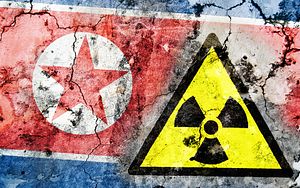Contradicting the long-standing policies of both the South Korean government and the United States, Kim Moo-sung, chairman of South Korea’s ruling Saenuri Party, told a meeting of college students that North Korea could be recognized and treated as a “nuclear power.”
“Internationally, a country could be recognized as a nuclear power if it carries out two to three nuclear tests,” Kim told a group of students in Busan, South Korea.
North Korea, per its constitution, considers itself a nuclear state and regularly threatens to use nuclear weapons to strike back at any foreign aggressor, including South Korea and the United States.
U.S. and South Korean officials take North Korea’s nuclear program seriously and acknowledge a real nuclear threat from North Korea.
For example, in a recent U.S. Senate testimony, U.S. Admiral Cecil D. Haney remarked that U.S. Strategic Command had credible reasons to believe that North Korea had succeeded in miniaturizing a nuclear device for delivery.
Haney’s comments, and remarks by South Korean officials in the past, suggest a de facto recognition of a North Korean nuclear capability.
Formally recognizing North Korea’s nuclear ability would effectively put an end to any hopes of negotiating a path toward denuclearization on the Korean peninsula.
The North Korean regime refuses to give up its nuclear weapons program due to the threat it perceives from the United States and South Korea.
Since the Six Party Talks — a diplomatic process involving the United States, South Korea, Japan, China, Russia, and North Korea — failed, the U.S. has been hesitant to return to negotiating table with Pyongyang barring a major concession on the nuclear weapons issue.
Pyongyang has yet to comply and, under Kim Jong-un, there is little hope that it will do so anytime soon.
According to Yonhap News, Kim’s comment was made as part of a declaration of support for the deployment of the U.S. Terminal High-Altitude Area Defense (THAAD) missile system in South Korea.
THAAD has drawn criticism from China which sees it as a threat to its ballistic missile capabilities. Last week, spokespeople from both South Korea and China traded sharp comments over the possibility of THAAD deployment in South Korea.
Kim’s comments are unlikely to lead to a broader change of policy by South Korea. Recognizing North Korea as a nuclear power would have significant consequences for the future of nuclear diplomacy on the Korean peninsula.
































